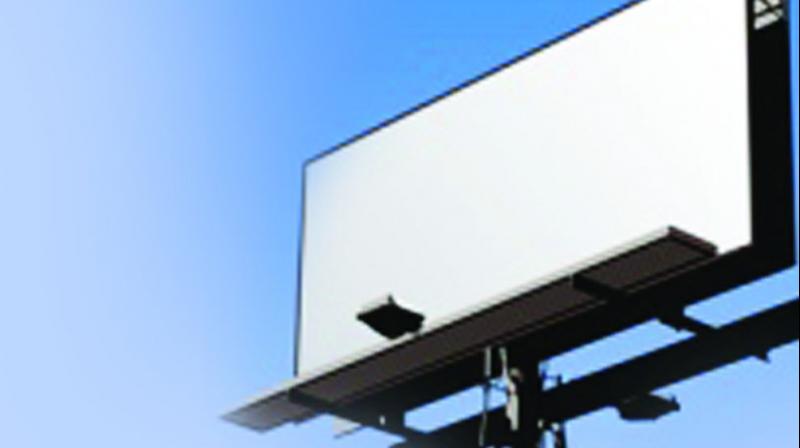Hyderabad corrupt agencies allow unipoles, public at risk
Experts call for outdoor advertisement policy in city.

Hyderabad: Hyderabad, a rapidly growing city, which wants to become a global destination for business and services, has no policy regulating advertising.
Advertising agencies are taking advantage of this situation and have been erecting hoardings that often pose a grave threat to people’s lives by being too big or insecurely erected.
Interestingly, Hyderabad is one of the few cities in the country to have massive unipoles to advertise which have minimal structural stability.
The city has as many as 350 unipoles which no other city in the country has, and which can cause severe damage to public and private properties at one go. Even though the corporation has asked advertising agencies to submit structural stability certificates (SSC), 60 per cent have not done so.
Though there is no official policy, the corporation has consulted experts from JNTU-H and had come up with a set of rules after the collapse of the unipole at Jubilee Hills checkpost in May 2016.
According to these rules, wall-mounted and ground hoardings of dimensions up to 40x25 ft and roof-top hoardings up to 30x25 ft will be permitted after inspection and certification by structural engineers under intimation to JNTU-H.
Permission will be accorded to agencies to advertise if they give an undertaking that in case of a mishap they alone will be held responsible for the consequences.
All hoardings will eventually be designed, certified and retrofitted in accordance with codes of practice.
Further, agencies will have to submit advertisements for ground hoardings, wall attachments and roof-top hoardings. Submission of third-party insurance will be required for flex boards. The agencies have to submit a structural stability certificate from GHMC’s empanelled engineers and then certification by the JNTU-H for allowing displays on unipoles and hoardings above 20X25 ft.
Agencies that don’t follow the rules will be blacklisted.
However, these rules are often violated as the empanelled agencies certify hoardings without field inspections. So, even hoardings which have structural stability certificates are unsafe. In the past year, three hoardings which obtained structural stability certificates collapsed — two at Vimal Theatre in Balanagar and Water Works office at Banjara Hills, and the third at SGM Mall in Mehdipatnam, which was unauthorised. The GHMC cancelled the structural stability certificates of the three hoardings.
A senior GHMC official admitted that there is no curb on illegal hoardings and said the city must have an approved policy for outdoor advertising.
“What can we do if empanelled agencies have certified the hoardings for '5,000 without a field inspection?” was his excuse. He also trotted out the other common excuse “staff crunch” for the corporation’s inefficiency. He said that the only solution is to geo-tag them after implementing the new advertising policy and monitor them on a regular basis. Data on hoardings should be kept in the public domain for accountability.
“If these changes are made, Rs 40 crore in annual revenue will be enhanced to Rs 100 crore within one financial year,” the GHMC official added.
New policy to ban nudity, drug ads
The Greater Hyderabad Municipal Corporation contemplating following in the footsteps of the Delhi Municipal Corporation and create an advertising policy for Hyderabad city.
According to the new policy, hoardings will be banned on busy arterial roads and will be erected in designated places, specifically in commercial areas.
The corporation will encourage paintings and wall mounted hoardings at busy stretches which will minimise the danger. Sign boards should be non-reflective so they don’t blind drivers.
According to the GHMC official quoted above, the new advertising policy will clarify the role of the GHMC in advertising regulations and revenue structure based on the size of the road in a certain area.
Under the policy, there will be five categories: large format advertisement, advertisement in public amenities, advertisement in transport entity, advertisement in commercial areas and all other types of advertisements.
Advertisements displaying nudity, illegal drugs, racist material, exploitative material relating to children and women, sexual subjects, cruelty to animals and encouraging violence will be banned.
No advertisement shall be erected, exhibited, fixed or retained ‘upon or over any land, building, wall, hoarding, frame, post or structure or upon or in any vehicle or shall be displayed within the jurisdiction of municipal corporation without written permission of the commissioner.’
The policy, which is now in its final stage of preparation, will be uploaded on the GHMC official website for public comments.

